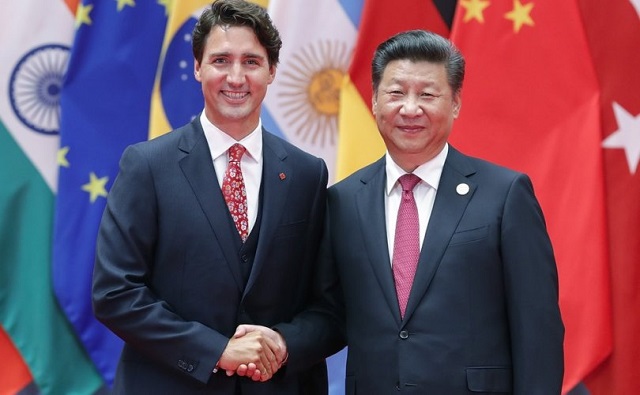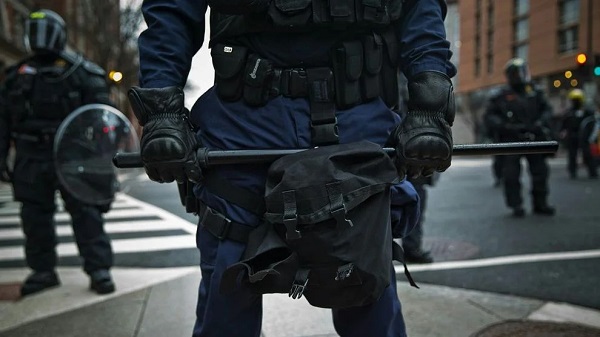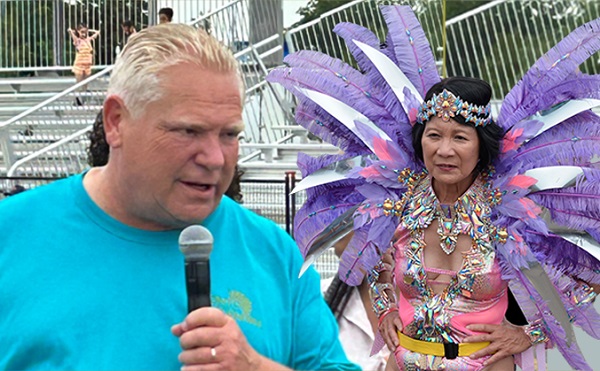National
Conservative report accuses Trudeau gov’t of ignoring Chinese interference because it helped Liberals

Chinese President Xi Jinping (right) shakes hands with Canadian Prime Minister Justin Trudeau to the G20 Summit on September 4, 2016 in Hangzhou, China.
From LifeSiteNews
By
‘Conservatives note that the Liberal government knew the Communist Party of China was interfering in Canada’s democracy for years and had they not been the beneficiary of this foreign interference the Liberals may have taken action…’ the report stated
Conservatives have accused Trudeau’s Liberal government of having ignored foreign interference because it was to their political benefit.
On October 24, Conservative Member of Parliament (MP) John Brassard published a report from Conservatives accusing the Liberal government under Prime Minister Justin Trudeau of ignoring Chinese interference in Canadian elections through China’s donations to the prime minister’s family foundation, the Pierre Elliot Trudeau Foundation.
“Conservatives note that the Liberal government knew the Communist Party of China was interfering in Canada’s democracy for years and had they not been the beneficiary of this foreign interference the Liberals may have taken action, rather than reacting to sustained public and political pressure,” the report stated.
“It is clear, through testimony heard by the committee from current and former members of the Trudeau Foundation, that the Foundation had no bylaws for foreign interference, no oversight of donations, and no due diligence done of donations,” it continued.
The report referenced a $140,000 donation by a Chinese billionaire, Zhang Bin, who has direct ties to Beijing. Bin was also photographed at a 2016 fundraiser with Trudeau. Furthermore, Trudeau’s brother, Sacha, was pictured accepting the donation from Bin on behalf of the Trudeau Foundation.
“Seemingly, it was the perfect conduit for a foreign dictatorship to influence Prime Minister Justin Trudeau,” the report stated. “The interference operation was proven successful as the two cutouts had direct access to the Prime Minister within five months of the donation.”
Following public outcry over the donation, Pascale Fournier, Former President and Executive Officer at the Trudeau Foundation, testified that “because of the allegations in the media, it would be best for the Foundation to repay the donation.”
According to Edward Johnson, chair of the board and founding member of the Foundation, the money was returned, and the deposit was confirmed in writing.
Similarly, Morris Rosenberg, former President and CEO of the Trudeau Foundation, claimed that donors never requested that the Foundation put them in contact with the Trudeau government. He added that he believed that Bin took a picture with Trudeau because “he wanted a photo with the prime minister to show to his friends.”
“In light of the evidence, the committee cannot take a definitive position on this case,” the committee ruled after the testimonies.
However, Conservatives pointed out that, “The irony is not lost on Conservatives that the beneficiary of a foreign interference campaign of disinformation perpetrated by the Communist Party of China would partake in a committee study pertaining to the very foreign interference campaign that helped him get elected.”
“This reinforces the fact that this Liberal government has an utter disregard for ethics and conflicts of interest,” the Conservative report continued.
As a result, the report recommended that, “the Government of Canada undertake a forensic audit of the Trudeau Foundation.”
The Foundation labels itself as “an independent and non-partisan charity established in 2001 as a living memorial to the former prime minister.”
Pierre Trudeau is the late father of Prime Minister Justin Trudeau and was prime minister from 1968 until 1984 except for a brief lapse from 1979 to 1980. He was known for his praise of the major totalitarian political systems of his day.
The Trudeau Foundation has undergone increased scrutiny regarding its connection with China, and the examination will continue. In late September, MPs from the House of Commons unanimously voted to have the country’s Auditor General investigate the $125 million taxpayer endowment given to help found the Trudeau Foundation in 2001.
This investigation comes just months after Canadian MPs from the House of Commons Public Accounts voted to begin an examination after a report surfaced detailing how the non-profit group received a $200,000 donation alleged to be connected to the Chinese Communist Party (CCP). Following the release of this report, the entire board of directors, including the president and CEO, of the Trudeau Foundation resigned.
Energy
It should not take a crisis for Canada to develop the resources that make people and communities thrive.

From Resource Works
Canada is suddenly sprinting to build things it slow-walked for a decade.
“Canada has always been a nation of builders, from the St. Lawrence Seaway to Expo 67. At this hinge moment in our history, Canada must draw on this legacy and act decisively to transform our economy from reliance to resilience. We are moving at a speed not seen in generations,” announced Prime Minister Mark Carney at the end of August.
He was echoed by British Columbia Premier David Eby shortly after.
“There’s never been a more critical time to diversify our economy and reduce reliance on the U.S., and B.C. is leading the way in Canada, with clean electricity, skilled workers and strong partnerships with First Nations,” the premier stated after his government approved the Ksi Lisims LNG project, led by the Nisga’a nation.
In the face of President Donald Trump’s tariffs, Ottawa has unveiled a first wave of “national projects” that includes an expansion of LNG Canada to 28 million tonnes a year, a small modular reactor at Darlington, two mines, and a port expansion, all pitched as a way to “turbocharge” growth and reduce exposure to a trade war with the United States.
The list notably excludes new oil pipelines, and arrives with rhetoric about urgency and nation-building that begs a simple question: why did it take a crisis to prioritize what should have been routine economic housekeeping?
The most tangible impact of resource projects can be observed in the impact it has on communities. The Haisla Nation is enjoying an economic renaissance with their involvement in the LNG Canada project on their traditional lands, which became operational in June.
Furthermore, the Haisla are set to unveil their own facility, Cedar LNG, in 2028. Already, the impact of employment and strong paycheques in the community is transforming, as former Haisla Chief Councillor Crystal Smith as attested many times.

Former Haisla Chief Councillor Crystal Smith.
“Let’s build a bright and prosperous future for every Canadian and every Indigenous person that wants to be involved, because change never happens inside of our comfort zones, or the defensive zone,” said Crystal Smith at a speech delivered to the 2025 Testimonial Dinner Award on April 24 in Toronto.
Fortunately, the new pro-resource posture has a legislative backbone. Parliament passed the One Canadian Economy Act to streamline approvals for projects deemed in the national interest, a centrepiece of the government’s plan to cut internal trade barriers and fast-track strategic infrastructure.
Supporters see it as necessary in a period of economic rupture, while critics warn it risks sidelining Indigenous voices in the name of speed. Either way, it is an admission that Canada’s previous processes had become self-defeatingly slow.
British Columbia offers a clear case study. Premier David Eby is now leaning hard into liquefied natural gas. His government and Ottawa both approved the Nisga’a Nation-backed Ksi Lisims LNG project under a “one project, one review” approach, with Eby openly counting on the Nisga’a to build support among neighbouring nations that withheld consent.
It is a marked turn from earlier NDP caution, framed by the premier as a race against an American Alaska LNG push that could capture the same Asian markets.
Yet the pivot only underscores how much time was lost. For years, resource projects faced overlapping provincial and federal hurdles, from the Impact Assessment Act’s expanded federal reach to the 2018 federal tanker ban on B.C.’s north coast.
Within B.C., a thicket of regulations, policy uncertainty, and contested interpretations of consultation obligations chilled investment, while political positions on pipelines hardened. Industry leaders called it “regulatory paralysis.” These were choices, not inevitabilities.
The national “go-fast” stance also arrives with unresolved tensions. Ottawa has installed a Calgary-based office to clear and finance major projects, led by veteran executive Dawn Farrell, and is touting the emissions performance of LNG Canada’s expansion.

Dawn Farrell, head of the Major Projects office in Calgary.
At Resource Works, we wholeheartedly endorsed the move, given the proven ability and success of Dawn Farrell in the resource industry. It must also be acknowledged that the major projects office will only be an office unless it meaningfully makes these projects happen faster.
A decade that saw eighteen B.C. LNG proposals produced one major build, and moving to LNG Canada’s second phase is entangled with power-supply constraints and policy conditions. That slow cadence is how countries fall behind.
If the current urgency becomes a steady habit, Canada can still convert this scramble into lasting capacity. If not, the next shock will find us sprinting again, only further from the finish line.
Resource Works News
Energy
A picture is worth a thousand spreadsheets

From Resource Works
What if the secret to understanding Canada’s energy future lies not in spreadsheets but in storytelling?
When I think about who has done the most to make sense of Canada’s energy story — not just in charts and forecasts but in human terms — Peter Tertzakian sits near the top of that list. He’s an energy economist, author, and communicator who has spent decades helping Canadians understand the world beneath their light switches and fuel gauges — and why prosperity, energy, and responsible development are inseparable.
Peter is the founder and CEO of Studio.Energy. He is also widely known as the founder of the ARC Energy Research Institute and co-host of the ARC Energy Ideas podcast, alongside Jackie Forrest. Week after week, they unpack what’s happening in the markets, in technology, and in policy, always with the rare gift of clarity. He’s also the author of two influential books, A Thousand Barrels a Second and The End of Energy Obesity, both written long before “energy transition” became a household term.
When we sat down for our Power Struggle conversation, I mentioned how remarkable it is that someone with Peter’s credentials — an economist, investor, and advisor to industry — is also an exhibiting artist whose photography can regularly be found in a gallery in the Canadian Rockies. That’s when he smiled and said what has become one of his signature lines: “I’ve always said a picture is worth a thousand spreadsheets.”

What followed was a fascinating discussion about how visual storytelling can bridge the gap between data and understanding. Peter explained that what began as a hobby has evolved into a personal quest to communicate complex energy subjects more effectively. His photographs, which range from industrial scenes to landscapes shaped by human activity, help connect the emotional and analytical sides of the energy story. The pictures, he said, reveal the same truths that his spreadsheets do — only in a way that more people can feel.
That resonates deeply with what we do at Resource Works — translating complexity into clarity so that Canadians can see how responsible resource development strengthens communities, funds public services, and opens doors for Indigenous partnerships. Like Peter, we believe that understanding energy isn’t about choosing sides; it’s about understanding systems, trade-offs, and the people behind the numbers.
Peter’s concern — and one I share — is how difficult it has become to find truth amid the noise. “People are bombarded by noise, especially today. And not all of that noise is true,” he said. “The challenge now is extracting the signal.” Whether you’re a policymaker, a corporate leader, or just someone trying to make sense of global change, Peter’s approach is to step away from confrontation and toward comprehension. His ability to blend visuals, narrative, and numbers makes complicated issues accessible without oversimplifying them.
Prosperity, Not Population, Drives Energy Demand
Our conversation also turned to the forces shaping global energy demand. Peter reminded me that the biggest driver isn’t population growth — it’s prosperity. “When a person moves from a rural setting to a city, their energy consumption goes up twentyfold, sometimes more,” he said. The story of urbanization, particularly in China, explains much of the past few decades of energy growth. Renewables have slowed that curve, but as Peter points out, “our use of fossil fuels is still growing.”
What I most admire about Peter is that he doesn’t preach. “I don’t have all the answers,” he told me. “My role is to discuss treatment options — not to perform the surgery.” It’s a refreshingly honest stance in a world where too many experts claim certainty.
On Power Struggle, Peter Tertzakian reminded me why he’s so respected across the energy world: he brings intelligence without ego, curiosity without ideology, and a deep respect for the audience’s ability to think. His work reminds us that Canada’s resource story — when told with honesty and creativity — is one of innovation, community, and shared prosperity. And that storytelling — visual, verbal, and numerical — remains our most powerful tool for navigating change.
- Power Struggle audio and transcript
- Peter Tertzakian in Arc Energy Research Institute podcasts
- Peter Tertzakian on X
- Peter Tertzakian on LinkedIn
- Stewart Muir on X
- Stewart Muir on LinkedIn
Power Struggle on social media
-

 International2 days ago
International2 days agoUS announces Operation Southern Spear, targeting narco-terrorists
-

 Censorship Industrial Complex2 days ago
Censorship Industrial Complex2 days agoEU’s “Democracy Shield” Centralizes Control Over Online Speech
-

 Addictions1 day ago
Addictions1 day agoCanadian gov’t not stopping drug injection sites from being set up near schools, daycares
-

 International2 days ago
International2 days agoIs America drifting toward civil war? Joe Rogan thinks so
-

 Business1 day ago
Business1 day agoParliamentary Budget Officer begs Carney to cut back on spending
-

 International2 days ago
International2 days agoBondi and Patel deliver explosive “Clinton Corruption Files” to Congress
-

 International2 days ago
International2 days agoState Department designates European Antifa groups foreign terror organizations
-

 Bruce Dowbiggin2 days ago
Bruce Dowbiggin2 days agoDEI Or Die: Out With Remembrance, In With Replacement









